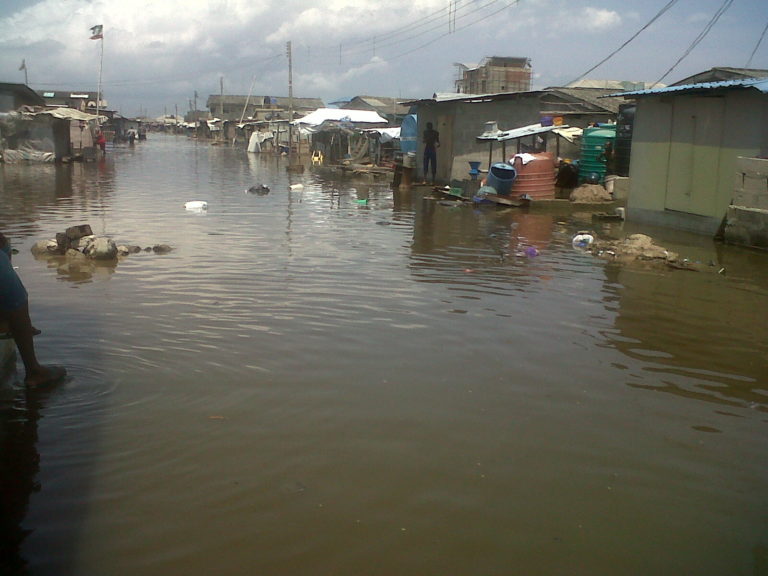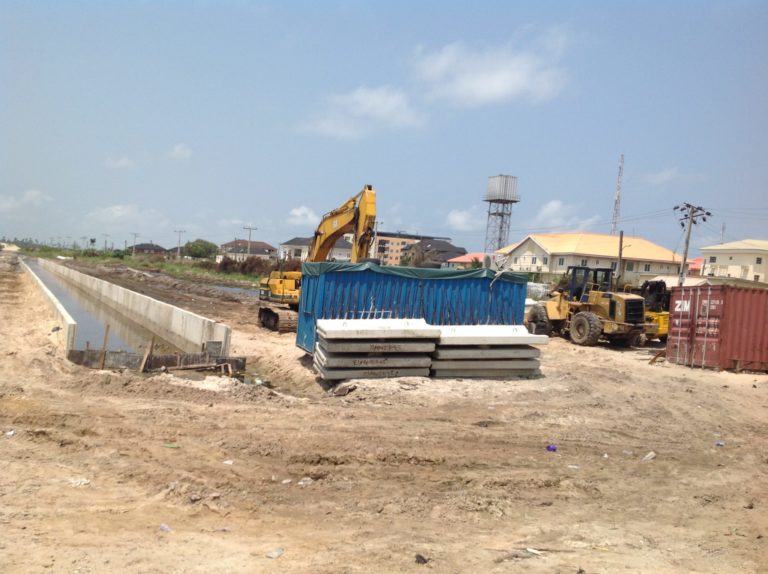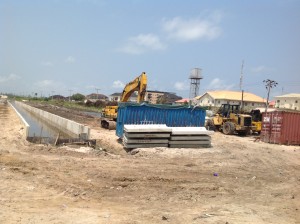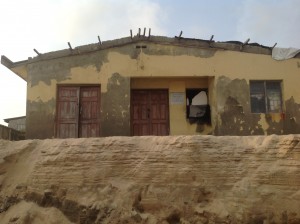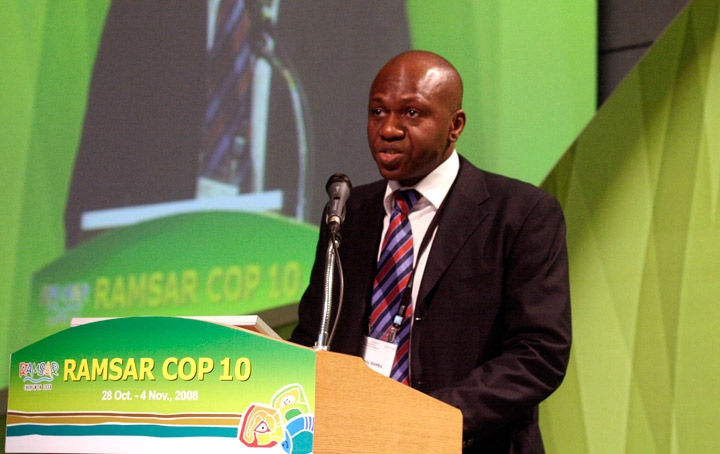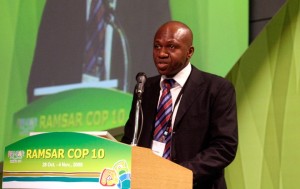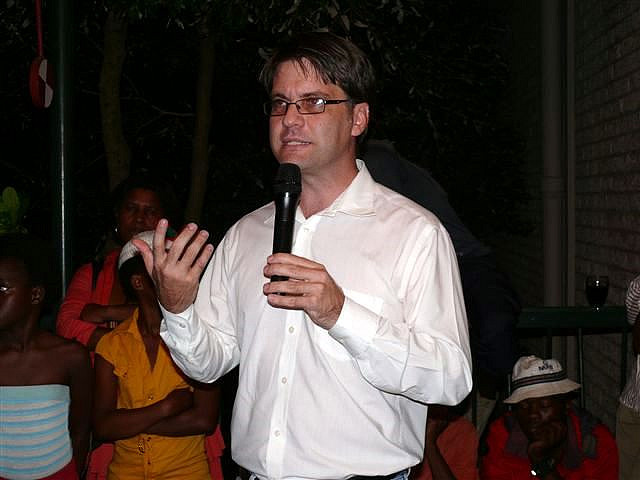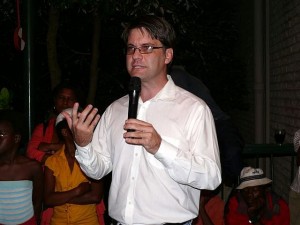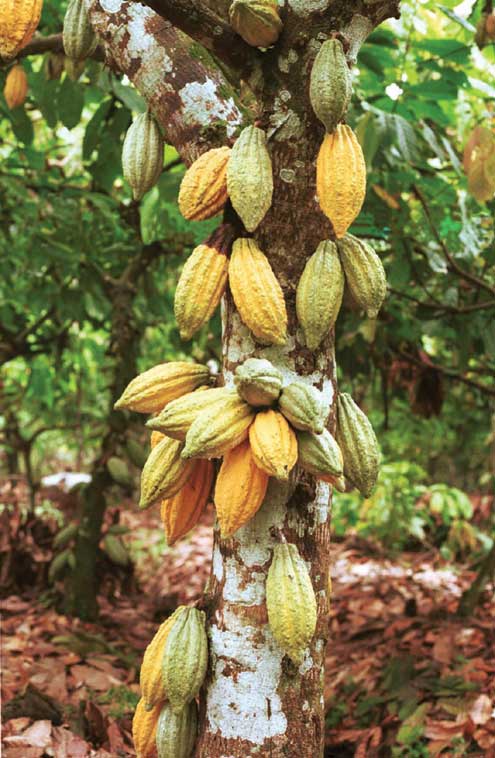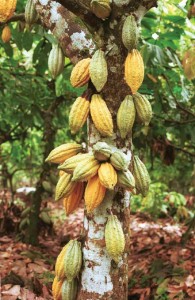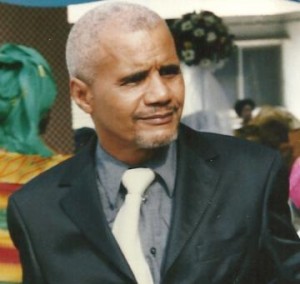Okun Alfa in Eti Osa Local Government Area of Lagos lives on the edge of the Atlantic Ocean. And it’s not just lulling beach waves, sand and sun. Its residents count their losses every time the waves come crashing into their lives – on one too many occasions. Nurudeen Oyewole has been there to see the fury of nature unleashed.
“We know the ocean surge is capable of submerging this community,” said Sheriff Elegushi, councillor for Okun Alfa community in Eti-Osa Local Government Area of Lagos State. He’s passionate about an impending ocean surge that could unleash disaster on Okun Alfa in Lekki area of the state.
“We know it is capable of sweeping us away. When that would be is what we don’t know. We are helpless about it.”
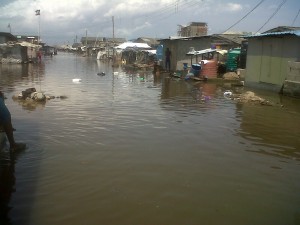
Counting the cost of an unfriendly ocean
Elegushi’s entreaties fit the harrowing lamentation of a community in distress. Young and old, men and women, wear long forlorn looks: their existence has been threatened on many occasions, their livelihood shattered.
Yet they hold on to tenuous hope of a better tomorrow even as their unfriendly neighbour, the Atlantic Ocean, brimming with fury, inches closer every second.
Once a leisure resort, Okun Alfa, otherwise known as Alpha Beach community, sits prettily close to the Atlantic. It is one of many coastline communities that had once reaped bountifully from the tourism potential of Lagos beaches but are now under ferocious attack from incessant ocean surges, thanks to climate change and rising sea levels.
The latest in a series of surges was midnight of May 30. The surge, more intense than others before, grounded activities in the community for seven day.
Homes were flooded, shops were washed away, electricity poles and cables were torn down. The community’s lone tarred road was under water.
The nerve centre of its economy – the water front of Alpha Beach – still is plastered with gaunt reminders of the havoc wreaked by that surge. Bars, relaxation spots, big hotels and small chalets thronged by tourists and funseekers were torn to shreds.
“Our children couldn’t go to school because most of the schools had been flooded. Our people couldn’t access healthcare services because the only functioning public health centre was actually ransacked by the rampaging surge. Our Baale’s (traditional ruler) palace was submerged half-way; it took the efforts of the youths and some of us to clear the palace of water and put in place guiding bricks,” said Elegushi.
“Houses were submerged to the extent that clothes, mattresses and many household utensils were floating here and there,” he added.
“The surge started late in the midnight, so our people were rudely awakened from their sleep. They had nowhere to go, so they were forced to stand on their feet. Even while standing, some were submerged up to their waist. Some of our parked vehicles were also submerged. I am a victim in that regard. My car is still with the mechanic as we speak,” Elegushi remembered.
Yet the ocean surge has been on for ages
Okun Alfa has a long history of ocean surges. Its current location is its fourth settlement site, community elders said. Over generations, they have been chased out and forced to relocate by surging Atlantic waves three times already.
“Our forefathers told us that the surges had always pushed them back at one point or the other. However, it was easy for them then because there was enough unoccupied land they could easily shift to. But there is not anymore available land around here for us to occupy now and that makes our case pathetic,” a local Chief, Nasirudeen Adisa, said.
“The last surge swept away my 16-room apartment. Apart from the fact that I lost my place of abode, my tenants on whose rents I lived, have all gone. I’m now a squatter at the Baale’s palace.”
Ironically, the ocean surge that crippled Okun Alfa and its neighbourhood came about 48 hours before the state government could press the panic button on a likely ocean surge. And when it did, it was the usual advisory note.
“We have been told that the rising sea level of the Atlantic Ocean might lead to ocean surge in some part of Ibeju Lekki and other coastline areas of Lagos,” Femi Oke-Osanyintolu, General Manager, Lagos State Emergency Management Agency (LASEMA), said in a statement.
“The imminent surge is the attendant impact of climate change as experienced by different regions across the globe… We advise our people to temporarily move to a safer region until the surge subsides so as to prevent needless loss of lives.”
Though residents of Okun Alfa confirmed that officials of LASEMA indeed came to assess the level of damage done to the community after the surge, no palliative measures, they said, have since been rendered.
Of course, that wasn’t the first time palliative measures will hang in the balance. Sometime in January, 2014, the state government had similarly promised to use the sum of N12.5 billion in the 2014 fiscal year to combat the menace of ocean surge in Okun Alfa and similar coastal areas, yet not a few are asking where the fund has so far been channelled with less than six months to the end of the year.
“Our land is our land”
The surge claimed no life while the harrowing experience lasted. But people who once occupied the shanties at Kuramo coastline of Victoria Island were not that lucky. A similar midnight surge ravaged the area two years ago, killing 16 people. In response, the government chased surviving slum dwellers out of the area. Repeating the same reaction might prove difficult at Okun Alfa, where many lay strong claims to ancestral root and lineage.
“We aren’t living in shanties. We didn’t just hijack the place and settle there. This is an established community. We have our history here. Our ancestral lineage, our root,” said Nureni Sanni, chairman of the community’s development association.
The argument is one of many that have set residents on collision course with the state government. While the government keeps preaching the gospel of resettlement, the residents say government should speed up completion of a 7km-long embankment which it started about two years ago around Goshen estate.
The estate, like Okun Alfa community, is on the coast. Perennial ocean surges into the estate had prompted the state government to kick-start the construction of an embankment, expected to reach Okun Alfa as well as Okun Ajah, among other communities.
“If you claim somewhere is your ancestral home and those ancestral homes keep disappearing every day, will you just stay there?” argued Adesegun Oniru, Lagos State commissioner for waterfront infrastructure.
“Won’t you try to move? Will you wait till you are consumed by the water? Eventually, the protection will come and then you can return to your place. But in the meantime, if there is need for you to move pending the time the protection gets there, won’t you just do that?
“I think that is the right thing to do for anybody with [a] right thinking mind. I really don’t think our people are that naïve when you know that this Atlantic, which you have no control of, is coming to consume you.”
On the worries that the project has only be moving at snail’s speed, raising serious doubt as to its early completion before the current administration bows out of office in May 2015, Oniru said the programme has actually been proceeding as expected and whatever was being observed as delay was a bid to get quality job done.
“That work is being programmed and the contractor executing the work is not behind schedule. If you really take out time to visit the place, you will see the amount of “x-blocks” that break the waves that are being put in place. This is not something that can be rushed. It takes a number of days to get those rocks from Ogun and Oyo states. So, we are keeping the contractor to time,” Oniru said.
Accusing fingers being pointed at government project: Eko Atlantic City?
In its 2009 report on the State of the World Cities, the United Nations Human Settlement Programme – otherwise known as UN-Habitat – identified Lagos as among cities around the world where 13 per cent of urban population is concentrated on the coastline.
Currently, about a million people live and work in Victoria Island, Lekki Peninsula and other parts of Eti-Osa Local Government. The peninsula itself was carved out from a masterplan for Lekki, and divided into five zones: the Lekki Free Trade, Lagos Lagoon, South Urban, Atlantic and Coastal. All the regions, with their glitz and glamour, are designed to lure and shelter about five million people in the nearest future. The first noticeable step in that direction was the commencement of the state’s government dream project: Eko Atlantic City.
Ocean surges and their attendant flooding are natural phenomena over which man has no control. This is more so at a time of widely acclaimed global warming and increased rainfall, both causing more serious flooding in many parts of the world. Flooding is also, undoubtedly, worsened by disruptions of the ecosystem. In Lagos, the view has been expressed that widespread land reclamation, including reclamation for the Eko Atlantic City, that will host 250 families, is responsible for increasing flooding in the state.
The Eko Atlantic City is expected to take up 1, 037.763 hectares of land, records from the state ministry of waterfront show. And as at March 2014, a total of 5,000,000 square metres have been reclaimed while 33, 085, 877 cubic metres of sand was said to have been pumped in.
At the turn of that milestone in February 2013, the state government invited President Goodluck Jonathan and former US President Bill Clinton for a ground-breaking event. Clinton Global Initiative sometime in 2008/2009 gave an eco-friendly award to Lagos in acknowledgement of that initiative.
But even with the promised eldorado, not everybody is keying into the dream of Eko Atlantic City. For some environmentalists and rights activists, even though surges that communities such as Okun Alfa suffer from can be attributed to the effect of climate change and global warming, there are evidence that intensity of those surges have actually increased with the massive dredging of the ocean by the state government.
“The arithmetic here is simple. When you dredge sand from a spot in the ocean, you have created a sort of hole and expanded its frontiers,” explained Niyi Samade, an environmentalist and rights activist.
“The water wave, previously being inhibited by the sand is let loose. And the more you dredge to say you want to go and sand-fill or reclaim a particular portion, the more water you let loose from the excavation site. So it is a case of robbing Peter to pay Paul. This, coupled with the ferocious effect of global warming, the resultant effect is disastrous ocean surges. So for us, the Eko Atlantic City is a time bomb,” he said.
Prof. Larry Awosika, head of geophysics department, Nigeria Institute of Oceanography and Marine Research (NIOMR), disclosed in one of his studies, that the Victoria Island is the fastest eroding beach in Nigeria, losing about 30 metres to the ocean annually. Ugborodo/Escravos loses around 24 metres yearly. And, by the end of the century, he said, Lekki and the Victoria Island would have lost 602 and 584 square kilometers respectively.
The predictions and recent discoveries might make some Nigerians likely to scream about the future of Lekki/Victoria Island communities and the proposed Atlantic City. Among the discoveries by geologists is a major crack in the Cameroonian faultline, which runs through the floor of the Atlantic Ocean, extending from Cameroon, through a number of islands, to Lake Chad.
The other is another fracture said to have been discovered at Ifewara-Zungeru and which has since been traced to the nexus of faultlines engraved at the bottom of the Atlantic.
Samade argued that the state government and its partner construction company, South Energy X, perhaps could have discovered some of the “inconsistencies as well as dangers” inherent in the Atlantic City project if thorough Environmental Impact Assessment (EIA) had been carried out when the project was being conceived.
“We aren’t at fault”
However, the state is pooh-poohing some of these hypotheses. The waterfront infrastructure commissioner insisted there were EIAs being constantly done as the project goes through different stages of reclamation.
“To carry out a project as big as the Eko Atlantic City, there are constant EIAs being carried out. As the project passes through different stages of reclamation, different stages of construction, you must be carrying out EIAs, be it positive or negative. It must also be noted that the city is being tested internationally to show that it does not have any negative impact on the vicinity or the environment where it is being created,” Oniru said.
On the allegation that the construction of the Atlantic City is worsening the challenge of coastal erosion in the area, the commissioner disagreed, saying, if anything, the project has only succeeded in reclaiming portions of land lost to the Atlantic. He added that the sand being used to reclaim those portions of land is being dredged some 15 to 20 km right into the Atlantic. He was however quick to accept that there are challenges especially in the flow of water on the eastern side of the Eko Atlantic City.
“On the other side of Takwa Bay which is called the Light House, you will see land and sand being accrued in that area because of the sand that is coming from the Bight of Benin. On the other side, where Eko Atlantic City is, which used to be known as Bar beach, the sand is not being allowed to go over. This has to do with the two moles, particularly the east mole. The problem is from the east mole. Everything eastward of the Eko Atlantic City is what we are facing as a challenge now. And the length of that to the boundary of Lagos state is about 85 to 87 kilometers of coastline. That we still need to work on and protect,” Oniru said.
Yet, respite not in sight
On government’s plans to supply relief materials to residents of Okun Alfa, Oniru said the only thing he had knowledge of was the construction of the embankment, which is expected to protect the community alongside others on the coastline. “That is what we know and that is what we are working on,” he said.
With that tone of finality, residents of Okun Alfa may have to wait much longer to have the much desired respite from their government.

